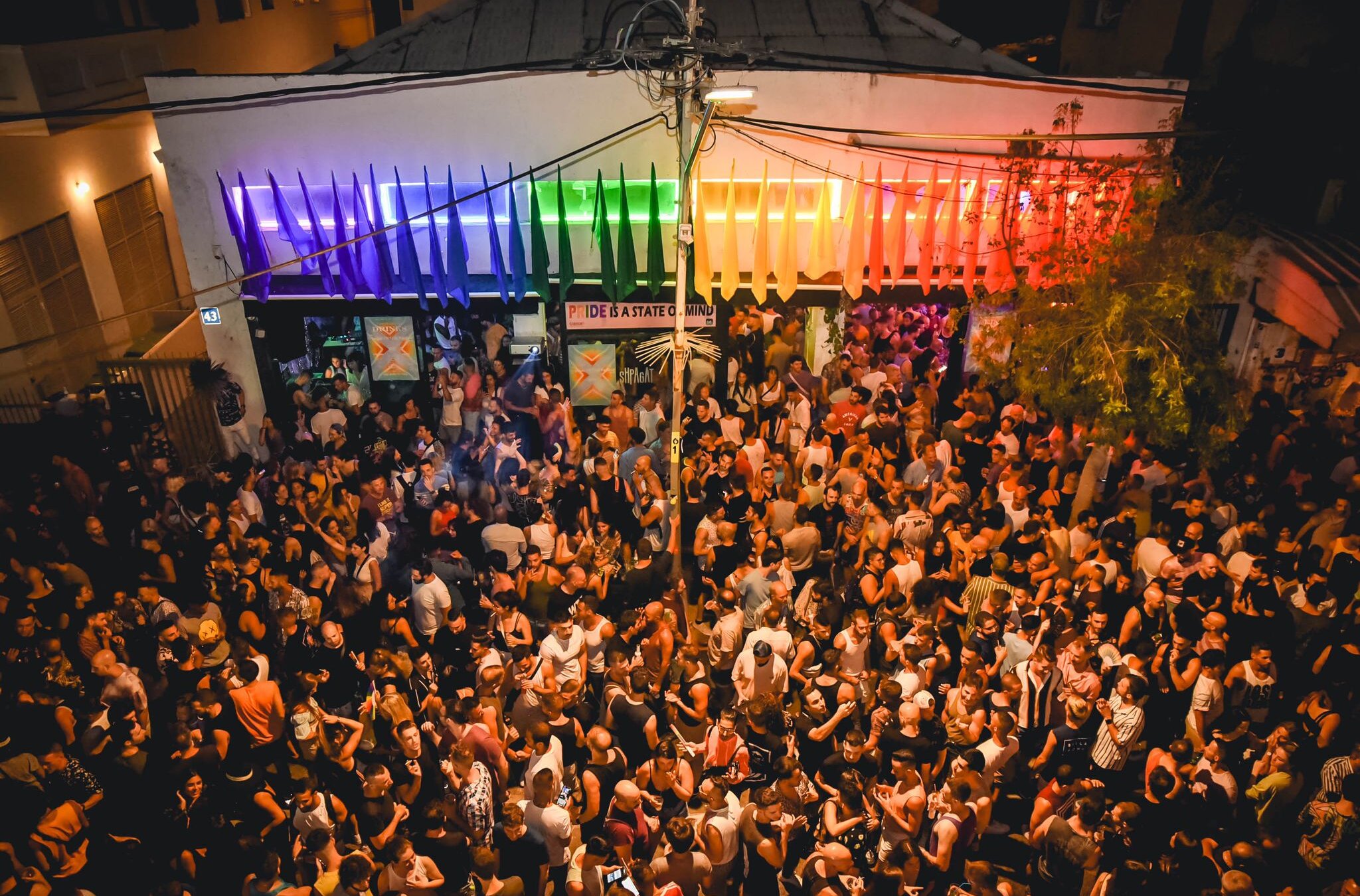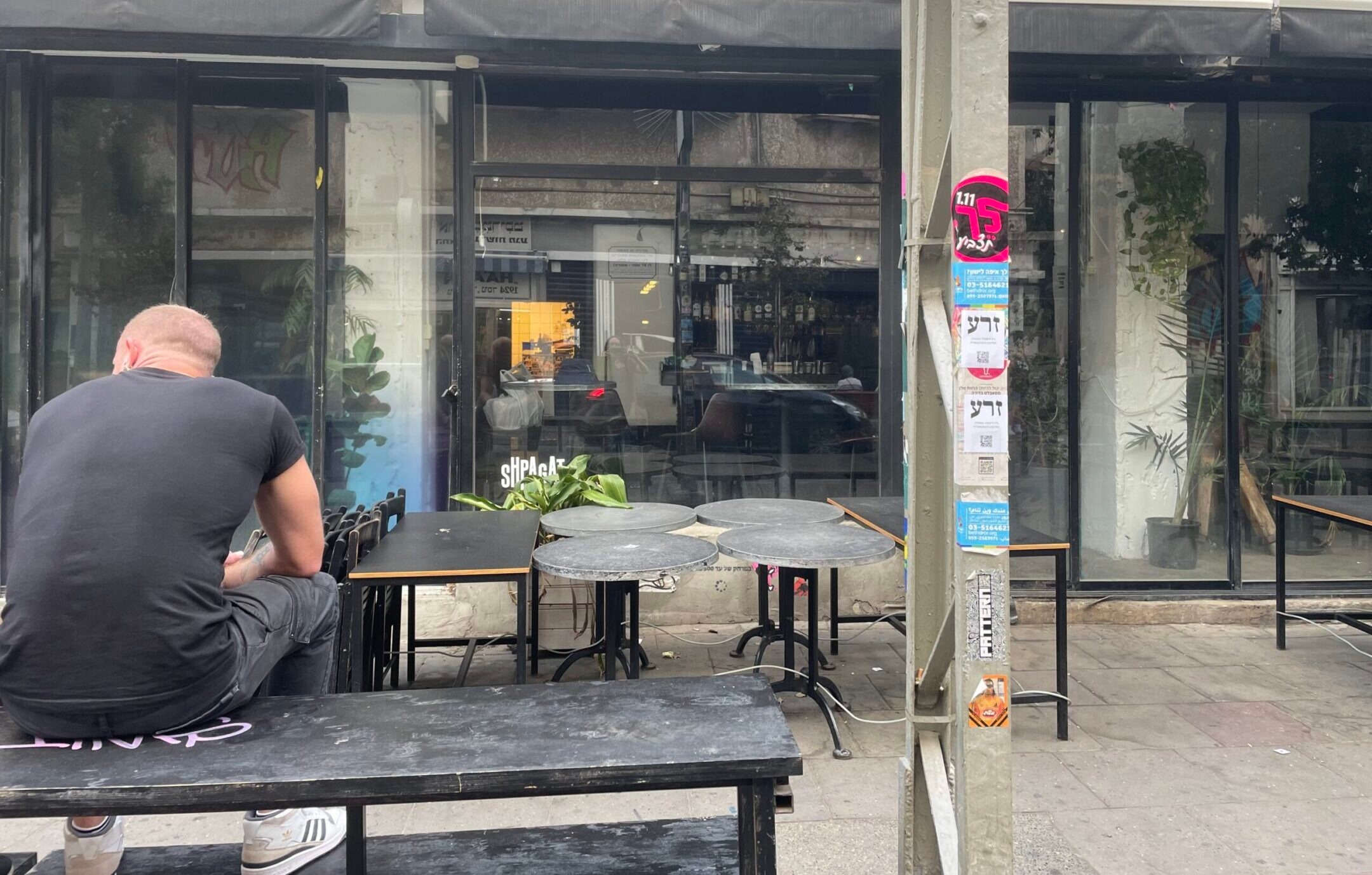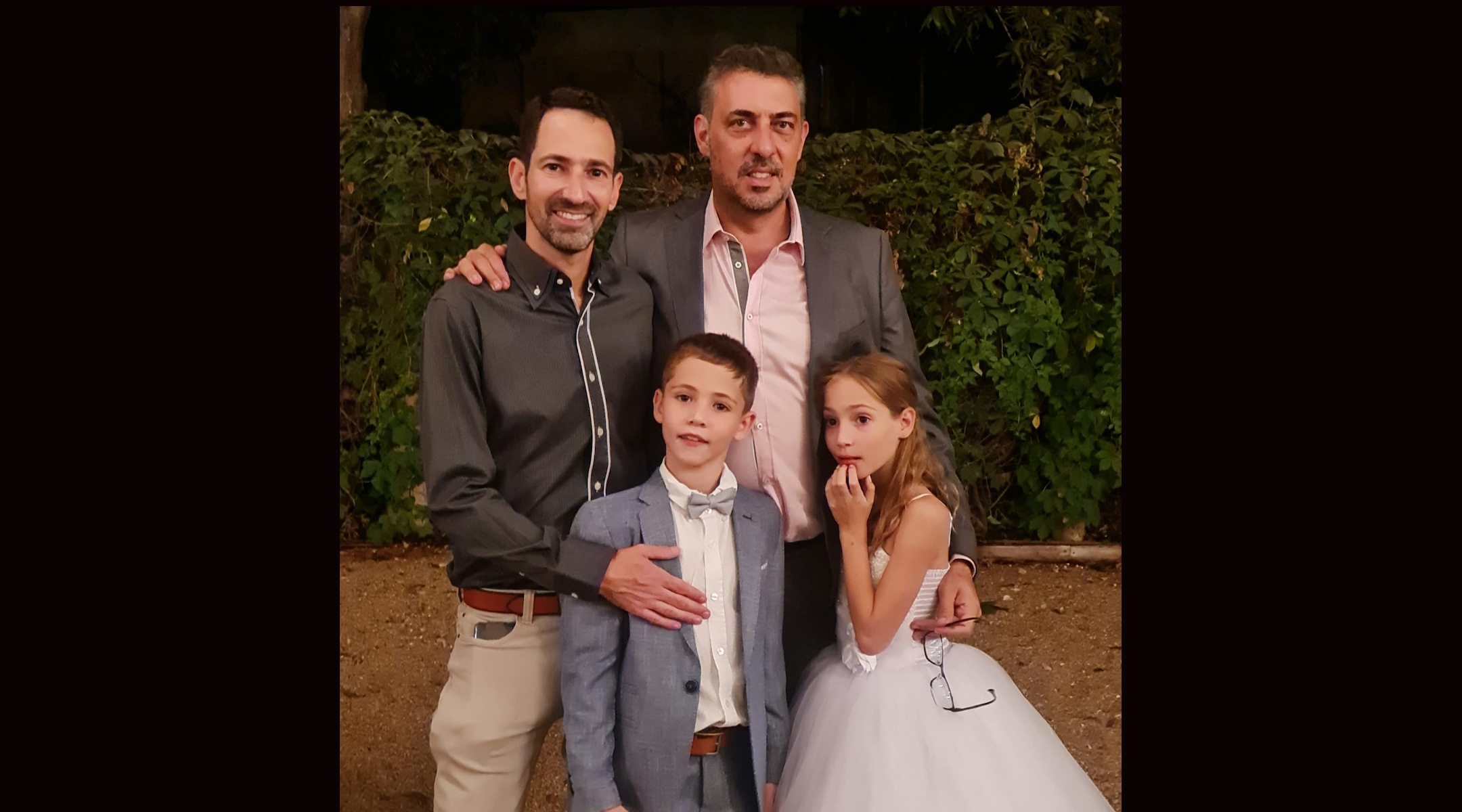LGBTQ Israelis fear setbacks as homophobic parties win a place in Netanyahu’s coalition
“I’m concerned that we will lose all the rights we gained with the recent government and over the last few years,” said one gay Israeli

A crowd of revelers outside Shpagat, a gay club in Tel Aviv, during Pride celebrations. (Courtesy of Shpagat)
TEL AVIV and JERUSALEM (JTA) — It was the day before Israel’s Nov. 1 election. In a classroom in downtown Jerusalem, Avi Rose was teaching about Jewish identity through art to a group of Jewish students from abroad spending a gap year in Israel. Suddenly, movement outside caught his eye.
Rose stopped his lecture and approached the second-story window. He was unprepared for what he saw. Dozens of religious Jewish youth from the homophobic Noam party were marching down Jerusalem’s Jaffa Street, chanting and carrying large anti-LGBTQ signs.
The sight was distressing for Rose, a gay Israeli artist who emigrated from Canada 20 years ago. In 2007, he and his husband, Ben, became the first Israeli citizens to have their same-sex marriage certificate from abroad recognized in Israel.
“I’m teaching this wonderful group of young people that have come from all over the world to have their moment in Israel, to finally be free in their Jewish homeland, to be in this democratic Jewish safe space. And they have to see their own teacher going, ‘Oh my God. There are these people out there who their sole purpose is to hate me.’ And it was a dissonance,” recalled Rose, who lives in Jerusalem with his husband and their 10-year-old twins.
“I mean, what the hell am I doing here if that’s the way we are as a Jewish people?” he continued. “And I was scared. I won’t lie to you. I was scared…. I had flashbacks about what my grandparents went through in Europe. And I had to remind myself we aren’t quite there yet. I’m not at the point [where I am going to] pack my bags and protect my children and get out of here.”
By the end of the next day, 14 members of the union of three far-right parties — Noam, Otzma Yehudit (or Jewish Power) and National Union — became the third-largest slate in the Knesset and the second largest in the governing coalition that Benjamin Netanyahu is now assembling. Netanyahu’s other coalition partners are two haredi Orthodox parties, Shas and United Torah Judaism. It will be the most right-wing conservative, religious government in Israel’s history, and its leaders are already vowing to roll back rights that LGBTQ Israelis have only recently won.
Israel does not permit same-sex marriage. But its Supreme Court has strengthened protections for Israelis who enter same-sex marriages abroad, requiring that the marriages be recognized by the state and ensuring that same-sex couples be permitted to adopt children and pursue surrogacy. Now, a Shas lawmaker could be appointed to head the ministry in charge of granting marriage licenses, and a self-proclaimed “proud homophobe” is poised for a leadership position as well.
“I don’t think they’ll criminalize my marriage or take my children away,” said Rose. “But there is a general sense of fear seizing the LGBTQ community.”
Noam, the smallest of three factions making up the joint Religious Zionism list, has focused on advancing policies that prevent the creation of non-traditional families, such as same-gender parents or children created through surrogacy, which it calls “the destruction of the family.” The party’s election slogan was a call to make Israel “a normal” nation.

In a 2019 tweet, the party outlined its vision for what “normal” means. “A father and a father is not normal,” the list began. It ended by alluding to the party’s opposition to Pride flags: “Asking to remove a flag that represents all this madness — that’s actually quite normal.”
One afternoon last week, two male cooks wearing tight black T-shirts exposing prodigious biceps were preparing for opening hour at Shpagat, Tel Aviv’s first gay bar. “Ohad,” who asked not to use his real name out of fear of being harmed, told JTA that there was great concern among his peers about how the new government would shift budgets, change laws and policies and deny LGBTQ Israelis their rights.
“I’m concerned that we will lose all the rights we gained with the recent government and over the last few years,” said Ohad. The outgoing government, a centrist interlude after more than a decade of right-wing leadership, was the most progressive in Israel’s history in terms of the gay community. “We’re talking about the most basic things, like being allowed to donate blood, being allowed to parent children through surrogacy, cancelling the prohibition of LGBTQ+ ‘conversion therapy.’ It’s both to cancel things and to go backwards.”

Indeed, one of the memes that worried Israelis have shared widely since election results came out reads, “Don’t forget that tonight, we are moving the clock back 2,000 years.”
Another issue is the distribution of government funding. Israel’s Ministry for Social Equality, for example, allocated 90 million shekels ($26.7 million) this year to benefit the LGBTQ community, which included funding for LGBTQ centers in some 70 cities. The education ministry and local municipalities also provide budgets to the Israel Gay Youth organization, and for teaching in schools about LGBTQ inclusion. Avi Maoz, the head of the Noam party, said he wants to cancel “progressive study programs” about gender.
A spokesperson for the Noam party was unable to make Maoz available and declined to otherwise offer comment.
Transgender Israelis could face the most stark changes. About 40% of transgender people have attempted suicide at least once in their life, according to the health ministry, and more than half avoid receiving medical care. Last year, the outgoing government’s health minister, Nitzan Horowitz, who is gay, set new policies to make healthcare more accessible to the transgender community.
Now the fear is that these policies will be canceled, as will be subsidies for sex reassignment surgeries and drugs. “For all the boys and girls who are in the process of defining their gender identity physically and emotionally, it will make their treatments very expensive or unaffordable,” said Ohad. “That can jeopardize their lives.”
It’s clear that the right-wing party leaders are not sympathetic to the plight of LGBTQ Israelis. Bezalel Smotrich, the head of the Religious Zionist party, identifies himself as a “proud homophobe.” In August, his party protested the enrollment of a third-grader at a religious boys’ school who had transitioned from his gender assigned at birth.
“There is no place in the national religious school system for such confusion of opinions and views that seriously harm the values, natural health and identity of its students,” Smotrich wrote to the education ministry.
The right-wing parties have trained their sights on Israel’s Supreme Court, which has delivered crucial victories to LGBTQ advocates and other minorities. The parties say the court is out of step with Israeli values.
One of the first legislative measures the next government intends to pass is the High Court Bypass Law, which would allow a simple majority of the Knesset’s 120 lawmakers to override Supreme Court rulings on laws that the court struck down, thereby undermining the court’s ability to protect human and civil rights.
“It will leave us as a defenseless minority,” said Liad Ortar, the head of an environmental, social and corporate governance firm, who spoke to JTA from the Climate Change Conference in Egypt. Ortar and his husband have 8-year-old twins through a surrogate from Thailand.

Many LGBTQ Israelis fear that lack of tolerance from government ministers could translate into incitement, harassment and physical attacks in the public sphere, and that the religious right-wing extremists who have directed violence towards Palestinians will now target them as well.
“In recent months there has been a very extreme escalation in what’s happening with the settlers and their violence, including the army, that doesn’t really provide protection,” said Ohad. “Not long ago there was an attack on a left-wing woman activist.… Those people are now going to become the ministers of education and culture. So aside from the Arabs and what the settlers do to them there, the next easy target is the gay community.”
In 2015, a religious Jewish man stabbed and killed Shira Banki, a 16-year-old girl marching with her family in Jerusalem’s gay pride parade — weeks after he completed a 10-year sentence for a similar attack in 2005. Now, members of the Religious Zionism slate have called to abolish gay pride parades.
“It’s not only that we are really afraid and worried about our own future. But it’s also our kids’ future. How will it look? And not just the kids of a gay couple, but gay children,” Ortar said. “We’re going to go back to the time where homosexuality can’t be shown publicly, whether at school or in the public sphere. Where they might beat the hell out of a gay couple because they walked hand in hand. Or cursing children in schools because their parents are gay.”
Not all LGBTQ Israelis are alarmed by the incoming government. Gilad Halahmi, a gay man who lives in Tel Aviv, has been active in promoting the Otzma Yehudit and has developed a personal rapport with its leader, Itamar Ben-Gvir. “The fact that he and Smotrich have an anti-LGBTQ agenda doesn’t mean they hate [us],” he said.
Halahmi said he believes his involvement has mitigated Religious Zionist stances on LGBTQ issues, and he also said Amir Ohana, a Knesset member from Netanyahu’s Likud party who is gay, had helped shift right-wing politicians’ views on those issues. But even without that, he said, the tradeoff to get the policies he wants on other issues is worth it.
“I give up LGBTQ rights, but I get something that is much more important to me in return, which is the economic issue, the security issue, the migration issue, governance,” Halahmi said. “It’s things that are 10 times more important to me than public transportation on Shabbat or whether I’ll get married in Israel or abroad.”
But for those who value religious pluralism and LGBTQ rights — and polls have shown that a majority of Israelis do — the current moment is alarming. On Sunday, Ben-Gvir vowed to revoke government recognition of non-Orthodox conversions to Judaism, in the latest sign that a far-right coalition would seek to create practical changes quickly.
For Rabbi Mikie Goldstein, the new government’s threatened assault on pluralism and LGBTQ rights offers a one-two punch that has him questioning whether he should continue living in Israel. Goldstein, an immigrant from England, was the first out gay pulpit rabbi in Israel when he took the reins of a congregation in Rehovot in 2014. Now, he leads the Conservative movement’s Rabbinical Assembly in Israel, working to support rabbis and their congregations who belong to the movement, known as Masorti in Israel.
“If I can’t do my work properly, if I’m not accepted — how much can you take?” Goldstein said. “I’m not prepared to give up yet [on Israel] but it’s certainly crossed my mind.”
LGBTQ activists say they won’t give up rights without a fight — and that they are prepared to mount one.
“We are very much united,” said Ortar. “We have a very strong civil infrastructure. The LGBTQ community is very well established in social and demographic groups. A lot of us are in the media, industry, high tech. After the statement about abolishing the parade, you could hear the drums beating. There will be demonstrations if that happens.”
In 2018, some 100,000 people demonstrated — outraged after then-prime minister Netanyahu voted against a bill to allow gay couples to use surrogacy.
Last week, Netanyahu tried to assuage fears and ordered officials in his close circle to tell the press that his government would not allow any change to the status quo regarding LGBT rights. But he did not come out saying it himself.
“This is the time to be angry, not scared,” said Rose. “We can’t be complacent anymore. The privilege of complacency has come to an end. That has to be the message of this election. You have to fight for what you want.”
This article originally appeared on JTA.org.
















